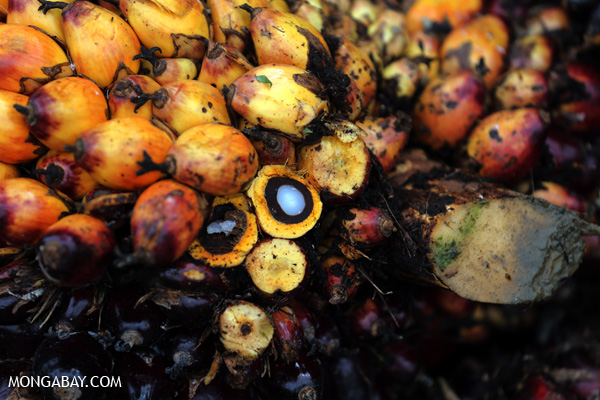
Oil palm fresh fruit bunches in Aceh, Indonesia. Photos by Rhett A. Butler.
This week several palm oil giants — Sime Darby Plantation, Musim Mas Group, Kuala Lumpur Kepong Berhad (KLK), IOI Group Corporation Bhd, Cargill and Asian Agri/APICAL — announced new environmental criteria for palm oil production. The companies, which have long been targeted by campaigners for forest destruction and social conflict, say the initiative goes beyond the industry-leading standard set by the Roundtable on Sustainable Palm Oil (RSPO), but two prominent environmental groups quickly disagreed, arguing the measure has substantial loopholes that will allow growers to continue destroying forests.
On the surface, the Sustainable Palm Oil Manifesto (SPOM) includes several provisions that are similar to high-profile commitments made by Golden Agri Resources and Wilmar, which environmentalists have lately championed as leading the way on transitioning toward greener palm oil. These include a zero deforestation commitment; a ban on conversion of peatlands; steps to reduce greenhouse gas emissions from operations, supply chain traceability, and respect for traditional land claims and free, prior and informed consent (FPIC). But unlike those earlier commitments, SPOM doesn’t set specific deadlines for compliance nor does it necessarily extend to partners and third party suppliers, according to Greenpeace and the Rainforest Action Network, who say that without stricter safeguards, the initiative is little more than greenwashing.
“Rather than stopping forest clearance, [SPOM] will allow for continued deforestation while members of the Manifesto study tools to determine what forests to develop or protect, known as the High Carbon Stock (HCS) Approach,” said Greenpeace in a statement. “It does not clearly state that no deforestation and no development on peatland will take place across the supply chains of SPOM members. This is significantly weaker than Wilmar and GAR’s existing No Deforestation policies.”

Activist protesting deforestation for palm oil in Indonesia
“The manifesto does not bind signatories to adhere to its principles in all the company’s operations, including subsidiaries regardless of stake,” added the Rainforest Action Network. “There is no clear commitment to apply the principles to third party suppliers who may continue to cause deforestation, expansion on peatlands and the violation of human and labor rights. This is a green light to continue to source Conflict Palm Oil from third party supplies and undermines the progress that is being made by peers to transform the palm oil sector.”
Indeed the backing of six major palm oil companies lends considerable weight to SPOM as an alternative to the Palm Oil Innovation Group (POIG) that Greenpeace, RAN, WWF, and others have been pushing as a way forward to improve the sustainability of the palm oil sector. POIG also endeavors to go beyond the RSPO standard, with stricter rules to limit deforestation and conflict.

Oil palm fruit in Sumatra
Both activist groups urged buyers to push for stronger standards.
“Our message to consumer companies such as Unilever, Nestle and P&G – which have promised consumers around the world clean, responsibly produced palm oil – is clear: do not be fooled by these half-baked commitments,” said Greenpeace.
“These companies must use their buying power to tell the signatories to stop the bulldozers from clearing forests and peatlands and to earnestly resolve the widespread conflicts in their supply chains,” added RAN’s Bill Barclay. “If this initiative was the only action taken by the manifesto’s signatories, it could undermine the very real progress being made towards achieving truly responsible palm oil on a global scale.”

Forest clearing for oil palm in Sumatra, Indonesia.
For their part, backers of the new initiative say more details — including information on the HCS study — will be released later this month. The HCS component is critical for evaluating the potential effectiveness of the initiative, since it governs what types of vegetation can be converted for plantations. The HCS standard could also be adopted by other players outside the palm oil sector — pulp and paper giant Asia Pacific Resources Limited International (APRIL) has already indicated that its conservation policy would be underpinned by an industry-wide HCS standard. POIG has its own standard, based on a process developed by Greenpeace, Golden Agri Resources and TFT.
There’s no indication of when the HCS standards may be harmonized. But in the meantime, Greenpeace is urging SPOM members to eclare a moratorium on areas that may eventually be declared HCS.
“To show they are serious about addressing deforestation, the group must immediately stop clearing potential HCS forests,” said Bustar Maitar, head of the Indonesia forest campaign at Greenpeace International.